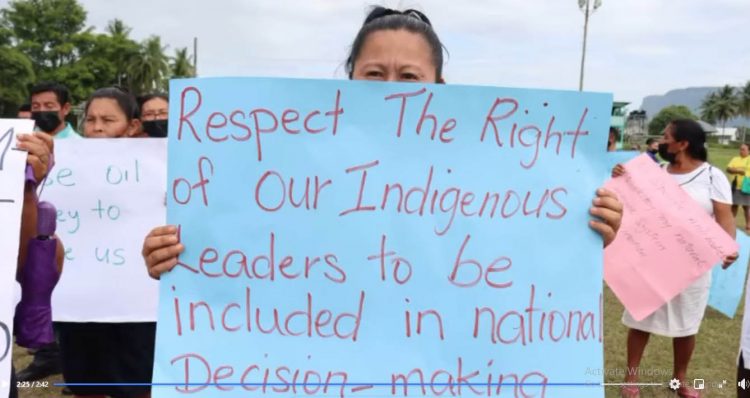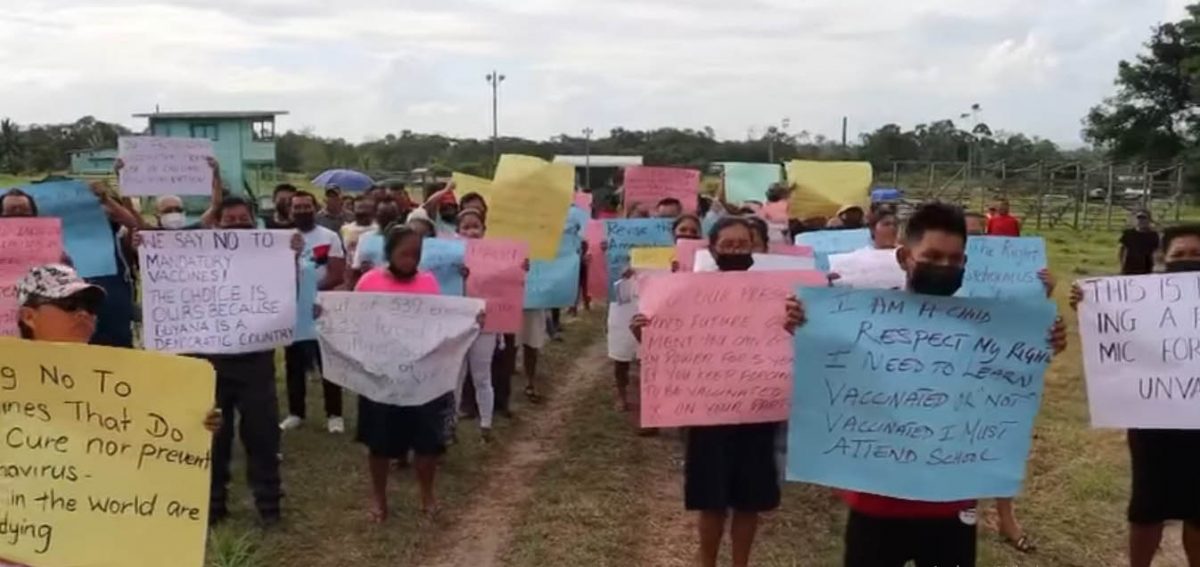Over 400 hinterland students have been denied access to classes in Region Seven since the resumption of in-school learning due to a requirement that they be vaccinated against COVID-19 in order to stay in dorms and the Education Ministry has since moved to rectify the situation.
While the students, who are from eight indigenous communities in the Upper Mazaruni district, still had the option of attending classes without staying in the dorms, many were unable to travel daily due to cost and the great distance from their homes.
“The government, through the Ministry of Education, has been insisting that no child should be denied education because of choice for vaccination but to get into the dorms — all the dorms throughout Region Seven — you are required to be vaccinated. If you are attending a school with a dorm you are automatically denying the kids from having an education. So that’s the technical matter that has not been resolved by the Ministry of Education,” Regional Chairman Kenneth Williams told Sunday Stabroek.

The situation prompted a protest by parents on Thursday in Waramadong, where the Desiree Fox Secondary School and dormitory are located. Minister of Education Priya Manickchand on Friday said that instruction has since been given to the Regional Education Officer of Region Seven to grant the students access to the dorm.
Williams explained to this newspaper that the vaccine requirement restricted the attendance at school of 435 students from the villages of Paruima, Kamarang, Kako, Jawalla, Phillipai, Imbaimadai/Omenaik, and Chinoweing simply because they had no accommodation.
There are over 500 students enrolled to attend the school.
Williams pointed out that they must be able to find an amicable solution that will allow students to access education, while with the rollout of the government’s vaccination programme in the region continued.
He posited that it is extremely difficult for parents to go the alternative route which will require them to have to find “a home out of the dormitory, cover their transportation cost to get from whichever vast distances and provide meals for them… in order to gain a high school education.”
However, Manickchand related that students can return as early as this week to school. However, she was quick to point out that with there only being a week remaining for the school term, it will be much more feasible for students to return in January.
She added that parents choosing to opt out of the inoculation programme for their children is a risk, particularly for those who want them to stay in the dorm.
Manickchand said too that while the delivery of education will be disrupted in such circumstances, schools and dormitories will not be closed.
“We are not closing school to anyone and if the only way to come to school is by the dorms — which means we cannot close the dorms, we are very certain about that — if people choose not to be vaccinated they will have to live with the risk of being infected and their education being disrupted because of that infection and that is a choice they are making. Our response to that choice will be consistently that they are not to be denied entrance unless positive,” she said.
However, she stated that dorm parents and all other associated workers are required to be vaccinated.
Scores of parents on Thursday called on policy makers to have them included in decision-making during their peaceful protest at Waramadong.
One of the parents stated that it is frustrating that they are unable to send their children to school due to the vaccination mandate. According to the parents, it is “unfair” to their children, some of whom are preparing for the Caribbean Secondary Examination Certificate (CSEC) exams and need guidance for School-Based Assessments, among other things.
Misinformation
Vice-Chairman of the Upper Mazaruni District Council, Lemuel Thomas, said that education on the importance of the vaccine is needed to address the skepticism people have about the vaccines. “Our people are treating this as a common flu and they are not convinced that COVID-19 is serious. They use the traditional remedies and that is what they believe in. They are not sure about the vaccines and there is more misinformation out there for them to access than the real facts,” Thomas, who is also the Toshao of Kamarang, explained.
“People are receiving hearsay information and some are scared because they have seen people getting sick from the side effects after taking the vaccine. This has cause them to not be willing to take the vaccine also, so we need some sort of educational campaign in the region to help address these concerns,” he added.
Thomas also pointed out that the vaccination requirement is not only affecting students but also persons who are required to travel out of the village in case of emergencies.
This, he said, does not sit well with the people as the policies on the coastland cannot be applied to them and they are calling for consultations.
In regards to medical emergencies, he noted that patients are allowed to travel but if the relative escorting them is not vaccinated they would be prevented from accompanying the patient during the medical transfer.
Thomas stated that this is one area the people wish to be consulted on as they are only required to travel in cases of emergencies.
Further, he stated that some health care workers are working overtime and around the clock in the villages due to the fact that some people chose not to be vaccinated.
“In some villages the vaccinated workers have to be working at nights when we have emergencies. Some teachers are not even turning out to school because they are not vaccinated,” he said as he spoke of the dilemma the villages face due to the vaccination requirement.
Mario Hastings, also of the Upper Mazaruni District Council, stated the indigenous people are “being discriminated because of decisions taken by policy makers.”
“We stand here to represent them [our children]… We must not be forced to take vaccines [when we were not consulted] and decisions were made at a national level. Our Children are suffering because they cannot attend school and continue learning,” he added.
Additionally, Thomas called on the government to look into local freight costs as they have been on an upward trajectory, which is placing a burden on the villages as prices for commodities have increased significantly. “We needed to protest to let the government know what we are facing and that we are demanding that they provide us with a solution,” he declared.
Another resident argued that government needs to consider the people in its decision making process. She said that the exclusion of indigenous people from consultation during the formation of policies is a breach of respecting their rights.






